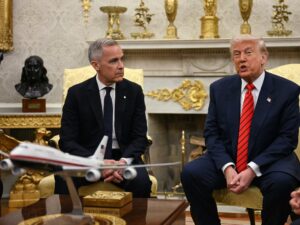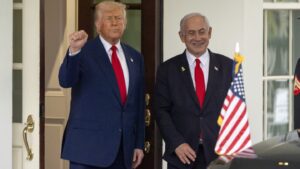
Israel has ordered evacuations in northern Gaza as military operations intensify, while former U.S. President Donald Trump calls for a ceasefire. The Israeli military’s actions have resulted in significant casualties, with at least 86 people killed in the 24 hours before midday on Sunday, according to the Hamas-run health ministry. Among the dead were three children, killed in an airstrike on al-Mawasi, a designated “safe zone.”
The escalation comes as Trump reiterated his calls to “make the deal in Gaza” and “get the hostages back,” emphasizing the urgency of a ceasefire. On Saturday, Trump stated on Truth Social that Israeli Prime Minister Benjamin Netanyahu was negotiating a deal with Hamas “right now.” Meanwhile, the Israel Defense Forces (IDF) have been operating in north Gaza with the stated aim of eliminating “terrorists and terrorist infrastructure,” according to IDF spokesman Avichay Adraee.
Intensified Military Operations
Residents and medics have reported increased military bombardments across Gaza, resulting in the destruction of several homes. The civil defense agency in Gaza, controlled by Hamas, reported that 23 people were killed on Sunday alone. In one tragic incident, five members of the Maarouf family, including three children, were killed in an airstrike on a tent housing displaced individuals in al-Mawasi.
“They bombed us while we were sleeping on the ground,” said Iman Abu Maarouf, the mother of the deceased children. “We didn’t do anything wrong. My children were killed, and the rest are in intensive care.” The family had relocated to al-Mawasi a month ago, following Israeli instructions to evacuate to the area.
“We didn’t do anything wrong. My children were killed, and the rest are in intensive care.” – Iman Abu Maarouf
The IDF, when asked about the incident, stated it could not provide a specific response without more information but emphasized that it “follows international law and takes feasible precautions to mitigate civilian harm.”
Efforts for Ceasefire and Hostage Release
The heightened military action coincides with renewed efforts by mediators to end the conflict and secure the release of hostages held by Hamas. A senior Hamas official indicated that while mediators have intensified their efforts, negotiations with Israel remain stalled. Qatar has expressed hope that U.S. pressure could facilitate a deal, especially following a recent truce between Israel and Iran.
Prime Minister Netanyahu, addressing Israel’s domestic intelligence agency Shin Bet, stated that “victory” over Iran has opened up new possibilities, including the rescue of hostages. “Of course, we will also need to resolve the issue of Gaza, to defeat Hamas, but I believe we will achieve both missions,” he said.
“Victory over Iran opened up many possibilities, first and foremost, to rescue the hostages.” – Benjamin Netanyahu
Historical Context and Humanitarian Concerns
This situation is reminiscent of past conflicts, where ceasefires have been fragile and often short-lived. In March, a two-month ceasefire collapsed when Israel launched fresh strikes on Gaza, citing pressure on Hamas to release hostages as the reason. The blockade on humanitarian aid deliveries to Gaza, imposed by Israel at the start of March, was partially eased after 11 weeks due to international pressure.
The creation of the Gaza Humanitarian Foundation (GHF), backed by the U.S. and Israel, was intended to address humanitarian needs. However, the GHF’s aid distribution system has faced criticism from UN agencies. Juliette Touma, communications director for the UN agency for Palestinian refugees, described the new mechanism as “a killing field,” arguing that orderly aid distribution can only be effectively managed by the UN and other humanitarian organizations.
“The new mechanism is a killing field.” – Juliette Touma, UNRWA
Johnnie Moore, head of the GHF, acknowledged incidents near aid sites but disputed claims that all casualties were related to the foundation’s operations.
Looking Ahead
The situation in Gaza remains volatile, with the potential for further escalation if a ceasefire is not reached. The international community continues to watch closely, with hopes that diplomatic efforts will yield a resolution that can prevent further loss of life and address the humanitarian crisis. As the conflict unfolds, the focus remains on achieving a sustainable peace and ensuring the safety of civilians caught in the crossfire.






